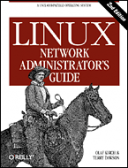Книга: Linux Network Administrator Guide, Second Edition
uucico Command-line Options
uucico Command-line Options
In this section, we describe the most important command-line options for uucico:
- - system, -s system
Calls the named system unless prohibited by call-time restrictions.
- S system
Calls the named system unconditionally.
- -master, -r1
Starts uucico in master mode. This is the default when -s or -S is given. All by itself, the -r1 option causes uucico to try to call all systems in the sys file described in the next section of this chapter, unless prohibited by call or retry time restrictions.
- -slave, -r0
Starts uucico in slave mode. This is the default when no -s or -S is given. In slave mode, either standard input/output are assumed to be connected to a serial port, or the TCP port specified by the -p option is used.
- -ifwork, -C
This option supplements -s or -S and tells uucico to call the named system only if there are jobs spooled for it.
- -debug type, -x type, -X type
Turns on debugging of the specified type. Several types can be given as a comma-separated list. The following types are valid: abnormal, chat, handshake, uucp-proto, proto, port, config, spooldir, execute, incoming, and outgoing. Using all turns on all options. For compatibility with other UUCP implementations, a number may be specified instead, which turns on debugging for the first n items from the above list.
Debugging messages will be logged to the Debug file below /var/spool/uucp.
- QLineEdit
- Appendix A. Detailed explanations of special commands
- Appendix D. TCP options
- Basics of the iptables command
- Commands
- LOG target options
- Configuration options
- Creating CDs from the Command Line
- Using the kill Command to Control Processes
- The echo command
- Можно ли отказаться от Проводника? Мне удобнее работать с Total Commander, но Проводник все равно постоянно «висит» в па...
- Total Commander




